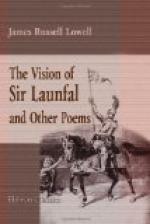In these papers, when studying poetry, he was very alive to the personality of the poets, and it was the strong interest in humanity which led Lowell, when he was most diligent in the pursuit of literature, to apply himself also to history and politics. Several of his essays bear witness to this, such as Witchcraft, New England Two Centuries Ago, A Great Public Character (Josiah Quincy), Abraham Lincoln, and his great Political Essays. But the most remarkable of his writings of this order was the second series of The Biglow Papers, published during the war for the Union. In these, with the wit and fun of the earlier series, there was mingled a deeper strain of feeling and a larger tone of patriotism. The limitations of his style in these satires forbade the fullest expression of his thought and emotion; but afterward in a succession of poems, occasioned by the honors paid to student soldiers in Cambridge, the death of Agassiz, and the celebration of national anniversaries during the years 1875 and 1876, he sang in loftier, more ardent strains. The most famous of these poems was his noble Commemoration Ode.
V.
PUBLIC LIFE.
It was at the close of this period, when he had done incalculable service to the Republic, that Lowell was called on to represent the country, first in Madrid, where he was sent in 1877, and then in London, to which he was transferred in 1880. Eight years were thus spent by him in the foreign service of the country. He had a good knowledge of the Spanish language and literature when he went to Spain; but he at once took pains to make his knowledge fuller and his accent more perfect, so that he could have intimate relations with the best Spanish men of the time. In England he was at once a most welcome guest, and was in great demand as a public speaker. No one can read his dispatches from Madrid and London without being struck by his sagacity, his readiness




